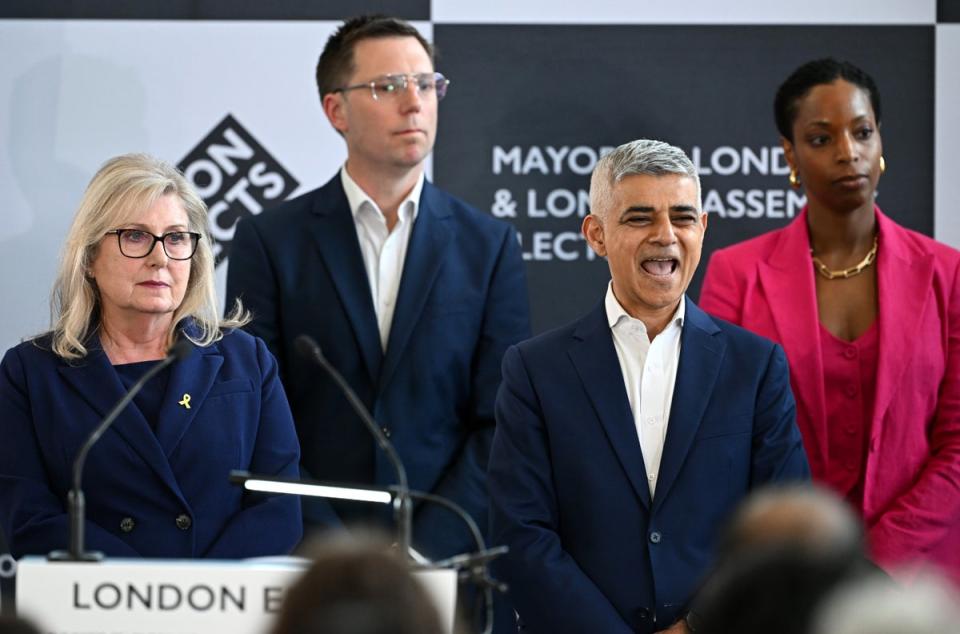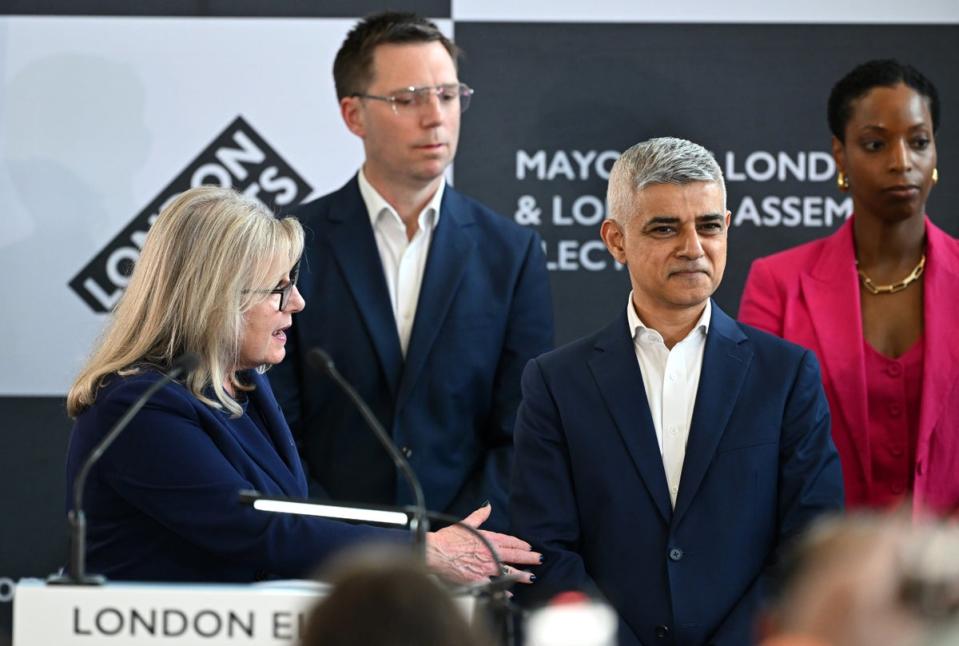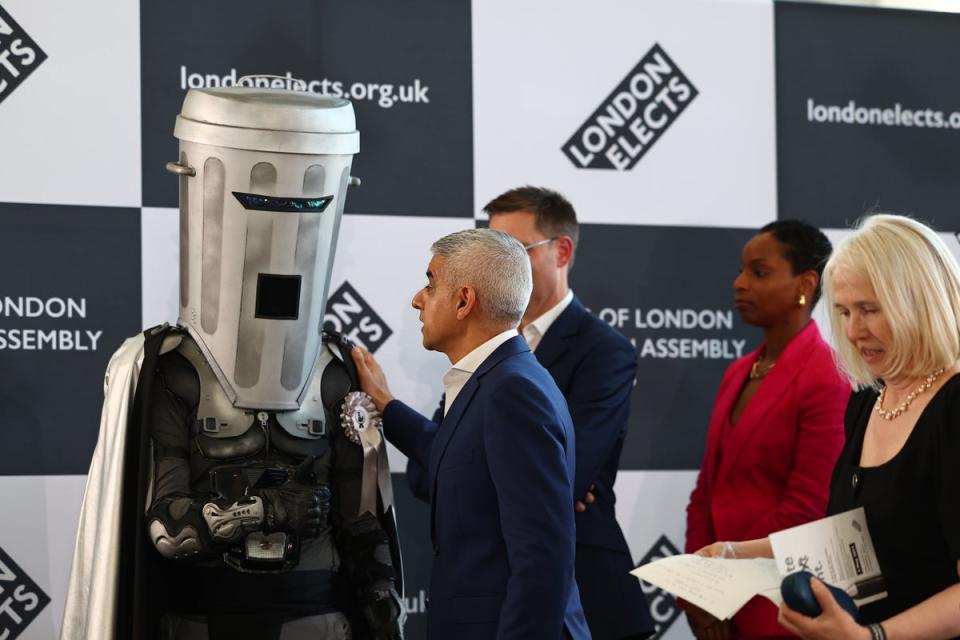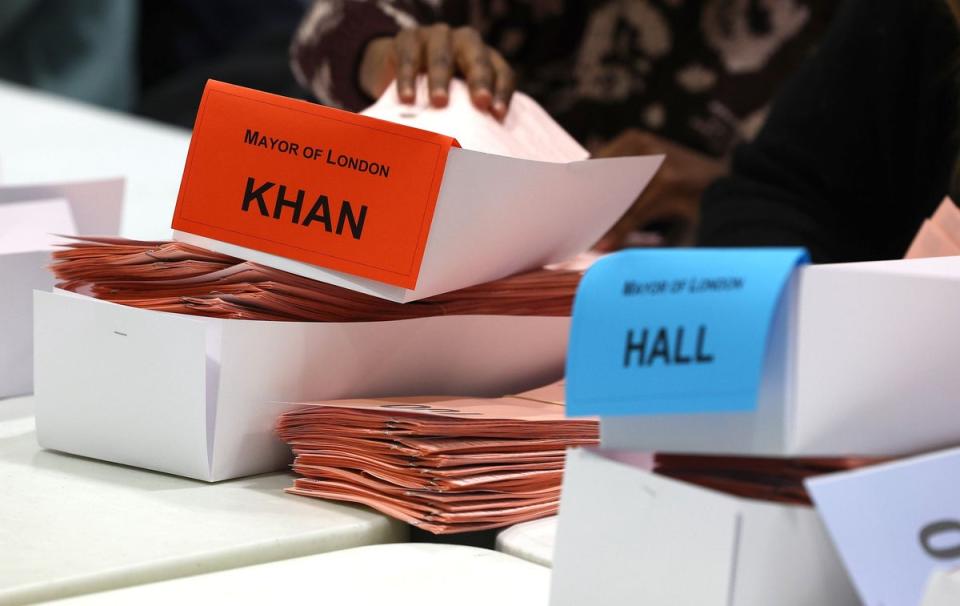Sadiq Khan wins historic third term as London mayor saying he answered 'hate with hope'
Sadiq Khan has been re-elected for an historic third term, bagging the second-largest majority in the history of the London mayoralty in the process.
The Labour incumbent won 1,088,225 votes – a majority of 275,828 over his main rival, Tory candidate Susan Hall.
Only Mr Khan, in first becoming mayor in 2016, has won by a bigger total – and that was under a two-vote system, rather than the traditional first-past-the-post system used in the 2024 elections.
Mr Khan’s aides described it as a “landslide win” and said he had claimed 44 per cent of the vote – up on 40 per cent in 2021.
By comparison, Ms Hall won fewer votes than her Tory predecessor Shaun Bailey achieved in 2021.
Mr Khan becomes the first London mayor to win a third term of office, which will see him in power at City Hall until 2028.
Mr Khan, whose victory speech was briefly interrupted by a walk-out by the defeated Britain First candidate, said it was “the honour of my life to serve the city that I love” and he was “beyond humbled”.
He said the mayoral race had been a “difficult few months” and said he faced a “campaign of non-stop negativity” that included “fear-mongering”, “hate” and “hard-Right wing populism”.

Speaking at City Hall, Mr Khan said: "We faced a campaign of non-stop negativity, but I couldn't be more proud that we answered the fear mongering with facts, hate with hope, and attempts to divide with efforts to unite.
"We ran a campaign that was in keeping with the spirit and values of this great city, a city that regards our diversity not as a weakness, but as an almighty strength - and one that rejects right hard-wing populism and looks forward, not back.
"It's truly an honour to be re-elected for a third term, and do so with a record level of support from Londoners, with an increased margin of victory."
Mr Khan thanked his family for their support, but apologised to them, telling the City Hall audience: "A special thank you goes to my mum, everything she's done for me. I love you. And to my amazing wife, Saadiya, and our daughters Anisah and Ammarah, for their strength and support throughout all these years.
"I know there have been times when this job has taken a toll on you. But that's not right, or fair.

"Some of the stuff on social media, the protests by our home, the threats. It's upsetting, it's frightening and it's wrong. I'm truly sorry for putting you through this.
"But I also know, you share my belief as hard as it can be sometimes, this work is worth doing because it means being able to give to other families the same life-changing opportunities that this wonderful city has extended to ours. I love you all so much."
He departed from normal election etiquette by not thanking the other 12 mayoral candidates.
Mr Khan said he had won record levels of support from Londoners, with an increased margin of victory. He said he would be a “mayor for all Londoners” – including those who did not vote for him.
He said: “My determination to ensure London leads from the front with world-leading green action remains as strong as ever.
“We have already made great strides cleaning up our air. We will continue to tackle pollution, whether it’s found on our streets or in our rivers.”

Ms Hall congratulated all other candidates “and Sadiq on his victory”.
She urged Mr Khan to mate the reform of the Met police his “top priority” to make Londoners “feel safe again”.
Ms Hall added: “I hope too that he stops patronising people, like me, who care.
“This isn’t an episode of The Wire. This is real life on his watch. I love London, and I urge Sadiq to try harder to make it better for all our sakes.”
Analysis of the election results showed Mr Khan defied expectations to outpoll his Conservative rival in two key constituencies where Tories previously dominated – West Central, comprising Westminster, Kensington and Chelsea, and Hammersmith and Fulham, and South West, which covers Richmond, Kingston and Hounslow.
Of the 14 constituencies, Ms Hall only polled more votes than Mr Khan in five - Bexley and Bromley, Havering and Redbridge, Croydon and Sutton, Ealing and Hillingdon and her home turf of Brent and Harrow.
About 2.5m Londoners cast a ballot – with the turnout falling slightly from 42 per cent three years ago to 40.5 per cent.

On the eve of polling day, Mr Khan had predicted a “very close two-horse race” and said he would be content with any margin of victory, declaring “a win is a win”.
But as votes from each of the constituencies were declared on Saturday afternoon, it became clear that Mr Khan had achieved a commanding victory in a contest that had included occasional ill feeling between the two main candidates.
At one debate, Mr Khan described Ms Hall as the “most dangerous” political rival he had faced.
She had focused her campaign on scrapping the Ulez expansion “on day one” of a Tory mayoralty, the rise in violent crime and on criticising Mr Khan’s oversight of the Met police.
But Mr Khan’s aides claimed his victory was a vote for free school meals – his landmark policy – plus increasing efforts to build more council homes and making London greener.
Labour won 11 of the 25 seats available at the London assembly with the Tories winning eight seats - including Ms Hall and the party's 2021 mayoral candidate, Shaun Bailey.
The Greens won three seats while the Liberal Democrats won two further seats.
Outside of London, Labour’s shock victory in the West Midlands mayoral election was a “phenomenal result” which was “beyond our expectations”, Sir Keir Starmer said, as the Conservatives were trounced in local elections.
Tory candidate Andy Street had hoped to cling on in the West Midlands, but Labour challenger Richard Parker beat him with a majority of just 1,508 votes.“This phenomenal result was beyond our expectations,” Sir Keir said.
“People across the country have had enough of Conservative chaos and decline and voted for change with Labour. Our fantastic new mayor Richard Parker stands ready to deliver a fresh start for the West Midlands.”
The party dominated mayoral elections across England, winning in Liverpool, South Yorkshire, West Yorkshire, and in Greater Manchester, where Andy Burnham returned to power.
Results were in from 106 of the 107 councils in England that held elections on May 2 and they show Labour has won 1,140 seats, an increase of more than 200.
The Liberal Democrats beat the Tories into second place, winning 521 seats, up nearly 100.
The Tories were just behind on 513 seats, down nearly 400.

 Yahoo News
Yahoo News 
